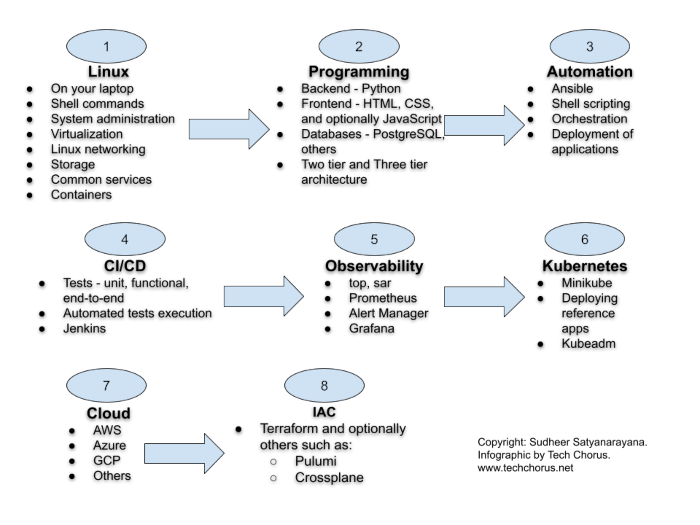Below you will find pages that utilize the taxonomy term “Infrastructure Engineering”
The DevOps Path
- Learn Linux. Install Linux on your laptop. Get familiar with Linux commands. Learn virtualization. Unlock the path to learn more Linux.
- Programming. Acquiring some programming skills using a general purpose programming language like Python goes a long way. Learning some web development is required in most DevOps engineering contexts. Although you don’t have to be an expert in web development, you should have a clear understanding of workloads consisting of web applications and microservices. Learning some HTML, CSS and JavaSript is required for web development. At this point, you have to learn at least one database system. I recommend PostgreSQL to get started with relational database system. Git is also an essential tool to manage source code.
- Automation is the cornerstone of DevOps engineering. Learn the basics of automation with Ansible and shell scripting.
- CI/CD. The purpose of DevOps is to create a culture and practice where developers can ship their applications
to customers quickly, safely and continuously. The
CI/CDpipelines often constitute the backbone of the DevOps practice. Jenkins is a popular tool to createCI/CDpipelines. Learn the basics of Jenkins and create pipelines to automatically test and deploy applications. - Observability and monitoring. Start with Linux commands such as
top,free,duand progress towards Prometheus. The typical Prometheus stack includes Alert Manager and Grafana. Then explore the world of traces with tools such as Jaeger and OpenTelemetry. - Kubernetes. The quintessential container orchestration platform.
- Cloud engineering. Start with one of the popular clouds such as
AWS,AzureorGCP. - IAC. Take automation to the next level in the cloud. Use Terraform to orchestrate resources in the cloud.
Tech Chorus References
- Learning Linux For Devops
- Preparing For A DevOps Engineer Job With A Personal Project
- Three Day Plan To Learn Git
Learning Resources
DevOps
- Coursera Course: Google IT Automation with Python Professional Certificate
- Crash Course On Python
- Using Python to Interact with the Operating System
- Introduction to Git and GitHub
- Troubleshooting and Debugging Techniques
- Configuration Management and the Cloud
- Automating Real-World Tasks with Python
Python
- Free interactive Python tutorial: LearnPython.org
Preparing For A DevOps Engineer Job With A Personal Project
The blog post attempts to answer some questions like:
- How to become a DevOps engineer?
- How to prepare for a DevOps engineer interview?
- How to get a DevOps engineer job?
In a previous blog post, I wrote about the path an aspiring DevOps engineer could follow.
In this blog post, I will lay out a concrete plan using which you can prepare yourself for a DevOps engineer job. If you follow the steps carefully, you will be armed with practical DevOps knowledge, and you will be able to apply for DevOps engineer jobs confidently.
Tech Chorus Blog Hosting Story
The Tech Chorus blog, started by Sudheer Satyanarayana in 2008, has evolved through various hosting technologies and software over the years. This post captures that journey, highlighting the transitions, challenges, and decisions that shaped its infrastructure.
The Early Days: Drupal and LAMP
Back in the day, the blog ran on the Drupal content management system (CMS), a popular choice among developers. The LAMP (Linux, Apache, MySQL, PHP) stack dominated web hosting at the time, and Drupal was one of my favorite CMSes. The site was hosted on a cPanel server, making management relatively straightforward.
